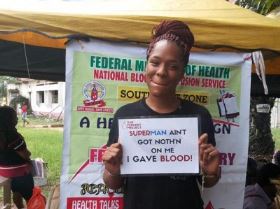This week’s guest post is by Temie Giwa-Tubosun, director of the One Percent Project, whose aim is to improve the blood transfusion system in Nigeria. At Nigeria Health Watch, we take blood donation very seriously. The One Percent Project uses an innovative app to connect those in need of blood to those who are willing to donate blood. For access to safe blood when it is needed most, this is indeed a step in the right direction. Editor’s Note: EpiAFRIC, a public health consultancy, plans to offer a short course on blood transfusions titled “Appropriate Clinical use of Blood and Principles of Transfusion Medicine”. Please go to EpiAFRIC’s Courses page for more information.
At least once a week, I am tagged in a Twitter or Facebook post for someone in desperate need for blood. Often by the time we get the message, the person who sent the request has gone eerily quiet. I am always afraid of this because I am never sure whether the required blood was found or the patient simply died. It is unsettling and something I can never forget. Too many patients are lost in Nigeria every year due to the lack of donor blood.

A young woman donates blood, critical to saving lives. Photo courtesy: One Percent Project
About four years ago, a bomb blast tore through the United Nations Building in Abuja, Nigeria, which left 21 dead and 73 wounded. At the time, there was a major shortage of blood, and many of the survivors barely made it due to lack of blood. I had always felt there was a need to tackle the blood shortage situation in Nigeria. The bomb blast was the final push that I needed to do something about this problem. I launched the One Percent Project with the help of my closest friends. At One Percent, we believe that technology can serve as an enabler to ensure fast innovation to help save lives.
Each day, 145 women of childbearing age and 2,300 children under-five die in Nigeria, according to UNICEF. Of all these deaths, a significant chunk of them can easily be attributed to lack of blood at the right time and place; at one hospital, lack of blood accounted for over 20% of maternal deaths. In 2012, 4,260 people lost their lives as a consequence of road accidents. Many of these deaths could have been prevented by functional emergency health services, of which access to clean safe blood is an important component.
Blood transfusion services are an indispensable component of health care delivery. The improvement in health indices we desire to see in Nigeria cannot be achieved without an adequate supply of safe blood to support other interventions for health system strengthening. Women and children are most vulnerable and therefore the ones in greatest need. While there have been efforts to strengthen blood transfusion services, not enough has been done to educate health care professionals on advances in transfusion medicine, appropriate clinical use of blood and issues related to wider blood safety practices.
Apart from storage and access, there are many issues with our blood transfusion services. There is safety to worry about; even if you are getting the blood you need, it could be deadly in the long run. A study carried out at a teaching hospital in Enugu showed that the incidence of transfusion related HIV infection was 1.2%; many other infectious diseases are also regularly transfused in our country. Ensuring that clean safe blood is available in each general hospital can change things. Blood from 100% volunteer donors is the single best thing to do to solve this problem. Unfortunately, Nigerians hardly donate blood voluntarily. The National Blood Transfusion Service (NBTS) reports show that 60% of all blood donations are from commercial donors, 30% from family replacement and only 10% are from voluntary donors. Those who do donate blood belong to a generation that is fast disappearing, despite the fact that the NBTS has zonal centres across the country where people can go and donate blood.

Nigerian Blood Transfusion Centers in Nigeria. Photo Courtesy: One Percent Project
The One Percent Project is dedicated to solving this problem. So far, we have collected 1,700 pints, which is enough to save about 5,000 Nigerians. We did this by developing an app, LifeBank, which fills the gap of matching desperate patients with the right blood donor, sorting for location and blood type. While we are quick to agree that the best solution is a centralized blood bank that can reach all emergency units across our country, only the government can champion that effort. In the meantime, the LifeBank app has the potential to save lives, and that is already a big step into the right direction for the blood transfusion system in Nigeria.

A young man about to donate blood – Will you save lives too? Photo Courtesy: One Percent Project
Each of us in Nigeria can begin to make a difference by registering with LifeBank. Joining LifeBank is easy. Just go to onepercentproject.org/lifebank. You can register to become a donor and, if you are a physician, you can register to become an administrator on our app. Do something special today, join us!



1 Comment